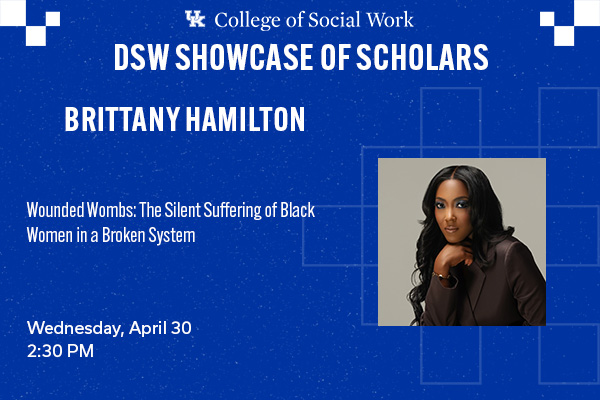DSW Candidate – Brittany Hamilton, 2:30 PM-3:45 PM
$0.00
Virtual Showcase of DSW Scholars 2025 Event!
Wounded Wombs: The Silent Suffering of Black Women in a Broken System
DSW Candidate – Brittany Hamilton, LMSW
Wednesday, April 30, 2025
2:30 PM-3:45 PM Eastern Time Zone
Credit Hours: 1.0 (ACE)
Description
Wounded Wombs: The Silent Suffering of Black Women in a Broken System
This capstone presentation, “Wounded Wombs: The Silent Suffering of Black Women in a Broken System,” examines the intersection of race, gender, and socioeconomic status as key factors affecting the reproductive health outcomes of Black women. The Intersectional Health Justice (IHJ) Model is presented as an innovative framework that integrates Intersectionality, Black Feminist Thought, and Womanism to specifically address the various healthcare disparities encountered by Black women.
The project explores systemic inequities in delivery of healthcare, the historical background of reproductive health inequalities, and the compounding trauma faced by Black women diagnosed with conditions including uterine fibroids and endometriosis. The IHJ Model emphasizes the importance of recognizing the lived experiences of Black women in developing trauma-informed, culturally competent, and equity-centered approaches to healthcare reform. It additionally promotes the timely and easier identification of commonly late or under-diagnosed diseases and the implementation of agency policy recommendations, such as amending intake forms to more effectively document social determinants of health and conducting pilot tests of these modifications.
The project consists of three fundamental components: a conceptual paper addressing systemic disparities, a systematic literature review strengthening research on reproductive health inequities, and a practice application paper recommending actionable remedies, all framed within an Administrative Leadership perspective. It aims to alleviate healthcare inequities and advance reproductive justice for Black women via practical, structural efforts.
Learning Objectives:
Upon completion of this conference, participants will be able to:
- Gain an understanding of the Intersectional Health Justice (IHJ) Model and learn how Intersectionality, Black Feminist Thought, and Womanism can be applied to address healthcare disparities affecting Black women.
- Evaluate the impact of healthcare policy changes by exploring methods to revise agency intake forms and implement policies that promote earlier and more accurate detection of reproductive health conditions commonly overlooked in Black women.
- Identify systemic barriers in healthcare by recognizing how historical and present-day inequities contribute to delayed diagnoses, inadequate treatment, and poor health outcomes for Black women with reproductive health conditions.
Delivery Method: Live Interactive Training via Zoom Video Conferencing
Credit Hours: 1.0 (ACE)
Target Audience: This conference is intended for social workers and students.
Accreditation: University of Kentucky College of Social Work, Provider # 1377, is approved as an ACE provider to offer social work continuing education by the Association of Social Work Boards (ASWB) Approved Continuing Education (ACE) program. Regulatory boards are the final authority on courses accepted for continuing education credit. ACE provider approval period: 9/29/22-9/29/25. Social workers participating in this conference will receive up to 15 general continuing education credits.
Claiming CE Credit: Instructions for claiming CE credit will be disseminated at the beginning of each session.
Questions: If you have any questions regarding CE credit or to report a grievance, please contact Christina Krantz at Christina.Krantz@uky.edu. For technical assistance, please contact lmshelp@uky.edu.
Disclaimer: The views and opinions expressed in these presentations are those of the individual presenters and do not necessarily reflect the official policies or positions of the University of Kentucky or the College of Social Work. The inclusion of any topics, perspectives, or discussions is intended for academic engagement and does not constitute endorsement by the institution.
